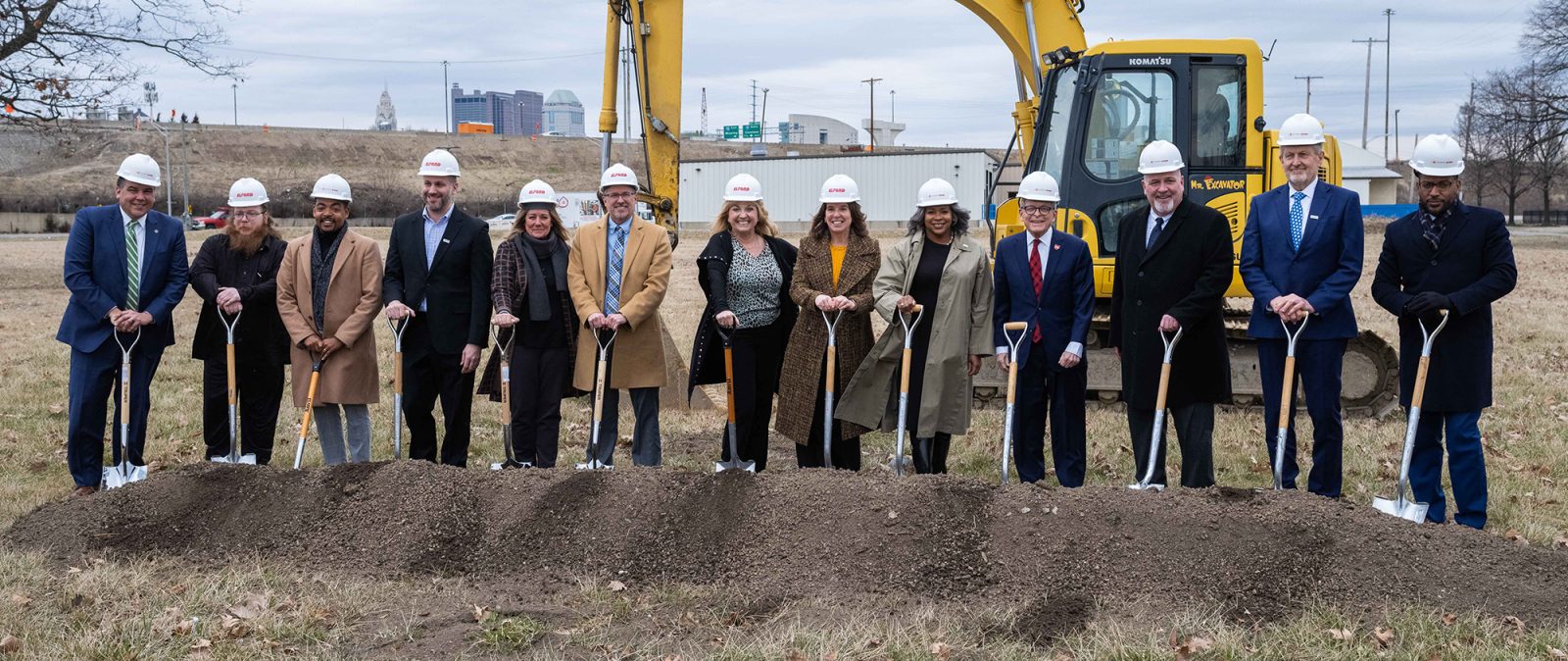
More than 100 community partners gathered on Feb. 7 to celebrate the ceremonial groundbreaking of the Franklin County Crisis Care Center, on-site at the property located at 465 Harmon Ave. Speakers shared what this facility will mean to the community and the hope it will provide to those in crisis once its doors open in 2025.
Many speakers emphasized the need for this facility due to the gap that currently exists in care. “In a mental health crisis, unlike a physical health crisis, the hospital emergency room is not an ideal environment for healing,” said Jenny Schoning, NAMI Ohio board member and family advocate, who opened the program talking about her son’s journey with mental illness.
“The first time my son was in crisis nearly 15 years ago, and at 17 years old, we were told to go to the hospital emergency room,” said Jenny. “He was manic, delusional and in extreme distress. My husband and I were anxious and exhausted. We spent more than 24 hours in a chaotic emergency department, waiting for a place to go for psychiatric care, and finally he was admitted. After a week-long stay, we left that first hospitalization with little more than a pamphlet on his diagnosis and a six-week wait for a psychiatrist.”
As Jenny went on to talk about what the new facility will mean to families like hers, she expressed both gratitude and excitement. “Today, I am so thrilled that individuals and their families coming to this center will have a totally different experience. They will be welcomed by mental health professionals and peers in a home-like, safe and comforting space,” said Jenny.
The Alcohol, Drug and Mental Health Board of Franklin County (ADAMH) has been leading the community planning and design of the crisis center. Voices from across the community have been part of the process, including mental health and addiction service providers, hospitals, public safety, advocacy organizations, and individuals and families with lived experience. This collaborative community effort was underscored throughout the groundbreaking event.
“It has taken so many people and so many teams, for many months and many years, coming together to make this commitment to accessible care a reality,” said ADAMH CEO Erika Clark Jones.
The Franklin County Crisis Care Center has not only benefited from tremendous collaborative support in its planning but it also has received funding from an array of institutions and donors. Furthermore, government financial support has come at every level—federal, state, county and city.
To demonstrate public sector commitment to the crisis center, a number of elected officials spoke at the groundbreaking alongside ADAMH leadership and community members. Ohio Gov. Mike DeWine, Columbus Mayor Andrew Ginther, Franklin County Commissioner John O’Grady and Columbus City Council President Shannon Hardin all gave remarks at the milestone event.
The governor shared that in his travels around the state, it’s become clear that mental health is an issue people care about and recognize. “I’m seeing this in Ohio, more and more a recognition that we have to deal with behavioral health, and we have to get people help,” said Gov. DeWine.
Commissioner O’Grady reinforced the prevalence of mental health issues and addiction by sharing statistics. “Roughly one in five Americans has a mental health emergency in any given year,” he said. “One in 10 abuses or is dependent on drugs or alcohol. In a county our size, that’s hundreds of thousands of residents who are in need of services.”
Mayor Ginther highlighted the increased need for services coming out of the pandemic, with so many experiencing isolation and depression. “There’s never been a greater need for this crisis center. Time is of the essence, and people of this community and communities around our state are counting on us,” said Mayor Ginther.
Just as the program began with Jenny’s personal account, it ended with another from Gary Krafthefer, marketing administrative coordinator at The P.E.E.R. Center. All employees at The P.E.E.R. Center have lived experience with mental illness, drug or alcohol addiction, or trauma. Gary expressed that he and his colleagues seek hope, solutions and respect. To him, the development of this crisis center is a turning point. “For the first time, I’m actually seeing a community come together, and not just seeing a dollar sign but seeing a person as an individual seek(ing) care.”
